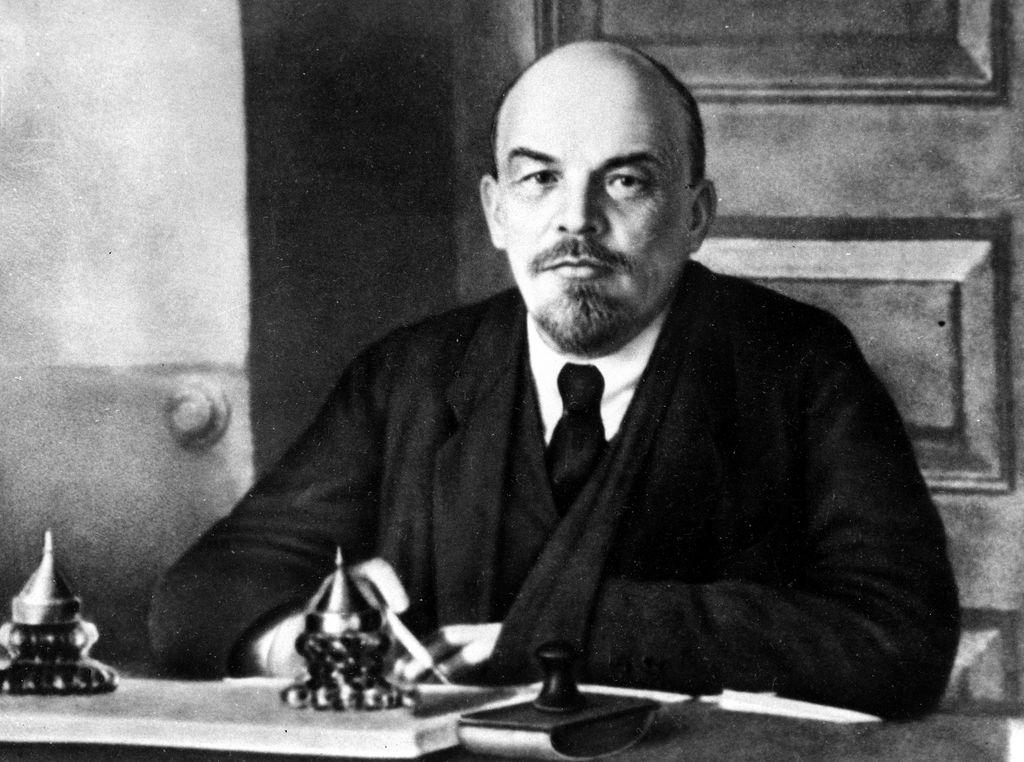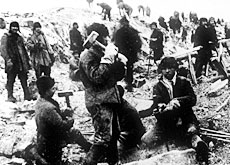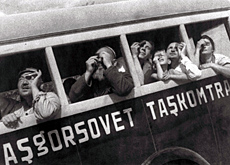Lenin and the Swiss non-revolution

Lenin, the father of the Russian revolution, worked on his theories for a popular uprising while living in Switzerland. During this time, the Bolshevik leader tried to convince his Swiss "comrades" of the need for an international revolution.
When Vladimir Ilyich Ulyanov arrived in Switzerland in 1914, he told the authorities he was neither an army deserter nor a coward, but a political exile. He had little difficulty gaining entry to the country.
To begin with he and his wife, Nadia Krupskaya, settled in peaceful, middle-class Bern.
As chairman of Russia’s Bolshevik party, which was at the time in a minority, Lenin tried to establish contacts with leftwing politicians in the area. However, they generally rebuffed his advances.
Bernese rejection
The Russian agitator’s radical ideas also fell on deaf ears at the clandestine Zimmerwald and Kiental conferences in Switzerland in 1915 and 1916, attended by dissidents from the European left in defiance of party orders.
When the First World War broke out in 1914, the European socialist parties all agreed to support their governments through the war.
But at the two international conferences delegates instead heard calls for peace and workers’ unity.
Lenin, one of the participants, had a different agenda. He wanted to use the “imperialist war” as a catalyst for an “armed uprising against capitalism”.
However, a majority rejected his hard line. The idealistic Lenin had a particularly hard job trying to convince the pragmatic and influential Bernese Social Democrat Robert Grimm.
Disappointed by the “Swiss social pacifists”, Lenin later referred to Grimm as “a barefaced scoundrel”.
Zurich life
In February 1916 Lenin was granted permission to move to Zurich where he had access to the central library. It was in Zurich that he finished his work “Imperialism: the highest stage of capitalism”.
For CHF24 ($20) a month he rented a two-room flat at Spiegelgasse 14 in the old town.
Lenin wrote to his mother telling her that he liked Zurich very much. He found the lake beautiful and spent many afternoons there with his wife.
But the Ulyanovs weren’t particularly impressed with Spiegelgasse. Nadia wrote in her memoirs that the yard was filled with the stink of the nearby sausage factory. She could only open the windows at night.
Delight
The real reason for Lenin’s move to Zurich was political: Lenin dreamt of an armed uprising, preferably also in Switzerland.
But he was cautious and determined not to run into conflict with the authorities in case they threw him out. At the same time he tried to surround himself with supporters who could spread his message.
The Zurich Social Democrats were more radical and determined than their counterparts in Bern – Lenin hoped they would be more receptive.
He joined the Zurich Social Democratic party and regularly attended their meetings. Observers said he always arrived early and took a seat in the front rows, although he never spoke.
At the same time he discreetly tried to find followers and was reportedly overjoyed when he managed to convince seven young workers to join his organisation.
Disillusionment
But not much came of it. By March 1917 he was showing signs of disillusionment. In letters he complained that leftwing sympathisers in Zurich had turned away from him, just as the Bernese had.
Lenin’s interest in Switzerland declined dramatically after he heard of a new revolution in Russia in 1917.
With the help of representatives of the political left in Switzerland, Lenin received permission to return to St Petersburg, crossing Germany by train.
On April 9, 1917, he left Switzerland for good. Six months later the Bolsheviks had seized control following the October Revolution and Lenin had secured his place in history.
Lenin spent six-and-a-half years in total in Switzerland.
Between 1903 and 1905 and in 1908 he lived in Geneva, from 1914 to 1915 he was resident in Bern and from 1916 to 1917 he lived in Zurich.
In September 1915 he attended the first conference of European Socialists opposed to the war at Zimmerwald in Bern. Delegates heard Lenin call for the transformation of the “imperialist” war into a civil war. The next year a follow-up conference was held in Kiental.
During his time in Zurich Lenin tried to split the Social Democratic party to found a movement which would bring about a popular revolution in Switzerland and elsewhere.
Vladimir Ilyich Ulyanov, pseudonym Lenin, was born in 1870 in Simbirsk.
While studying law at Kazan University he converted to the Marxist ideology. His political involvement in St Petersburg was triggered by anti-Tsarist protests.
In 1895 he was arrested and exiled to Siberia. Afterwards he lived in exile in Switzerland and Germany.
At a congress in London in 1903 the Russian Social Democratic Party split into two factions: the Bolsheviks (led by Lenin) and the Mensheviks.
On January 21, 1924, he died following a serious illness aged 54.

In compliance with the JTI standards
More: SWI swissinfo.ch certified by the Journalism Trust Initiative



You can find an overview of ongoing debates with our journalists here. Please join us!
If you want to start a conversation about a topic raised in this article or want to report factual errors, email us at english@swissinfo.ch.